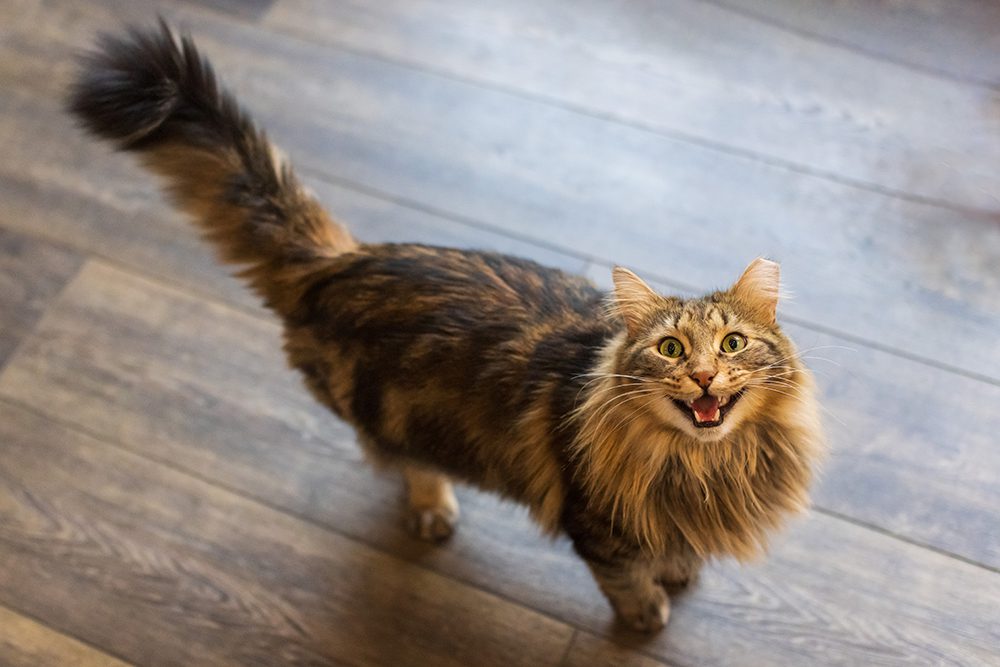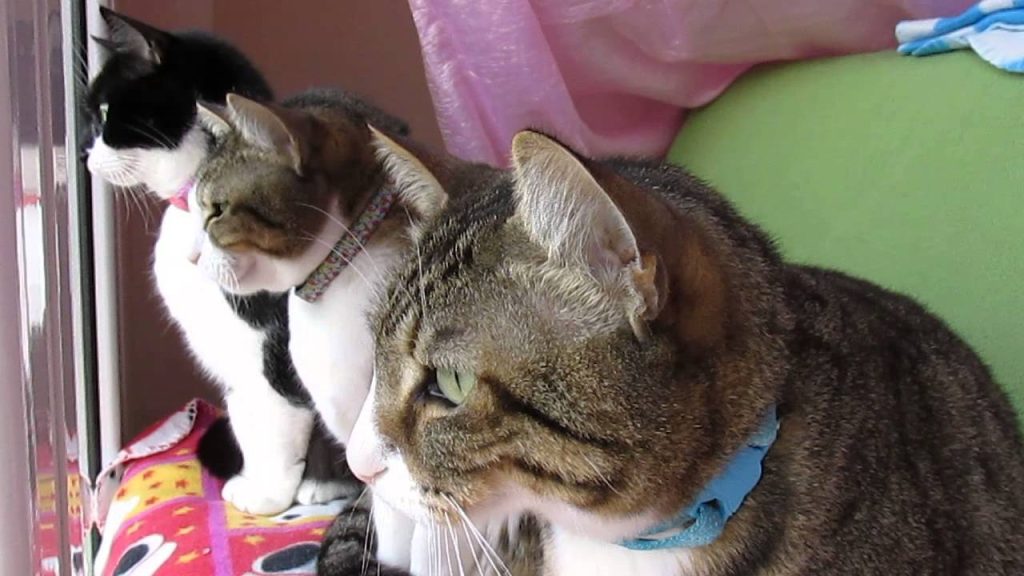My cat meows at birds because he is instinctively communicating and expressing his prey drive. When cats see birds, their natural hunting instincts kick in, causing them to make vocalizations like meowing in excitement or frustration.
The sight and sounds of birds stimulate their predatory instincts, resulting in their desire to communicate with them through meowing. This behavior is quite common in cats and is a result of their innate hunting instincts.
1. Understanding The Predatory Instincts Of Cats
Understanding the predatory instincts of cats is essential to unravel the mystery behind their fascination with birds. Cats have an innate drive to hunt, which is deeply ingrained in their DNA. This natural instinct originates from their wild ancestors who relied on hunting for survival. Domestic cats may not have to catch their own food, but they still retain this instinctual behavior.
Observing hunting behaviors in domestic cats is an intriguing way to comprehend their fascination with birds. Cats often exhibit stalking, pouncing, and swatting motions when they see birds. They may also meow as a form of communication, expressing their excitement or frustration at not being able to reach their feathered friends. It’s important to remember that this behavior doesn’t stem from a desire to harm birds, but rather from an instinctual response to potential prey.
Cat owners can help satisfy their feline’s hunting instincts by providing interactive toys that mimic prey movement. This not only provides mental stimulation, but also allows cats to engage in their natural behaviors in a safe and controlled environment. Understanding and respecting the predatory instincts of cats can help foster a healthy and enriched life for our beloved pets.
2. Why Cats Meow At Birds
Cats are known for being vocal creatures. They often use meowing as a form of communication with their owners. When it comes to meowing at birds, there can be a few reasons behind this behavior. The allure of birds’ movements and sounds is often one of the main factors. Cats are natural hunters, and the sight and sound of birds can trigger their hunting instincts. It is their way of expressing excitement and desire to catch their feathered friends. Meowing at birds may also be a way for cats to communicate with their owners. They may be trying to get their attention or show excitement about the interesting creatures they have spotted. So, if you notice your cat meowing at birds, it could be a combination of their natural hunting instincts and their desire to communicate with you. Understanding these factors can help you better understand your feline friend’s behavior.
3. The Psychological And Biological Reasons Behind The Meowing
It is not uncommon for cats to meow at birds, and there are several psychological and biological reasons behind this behavior. One possible reason is that cats may be expressing frustration or longing for prey. Birds are natural prey for cats, and when they cannot physically access them, they may meow as a way to release their pent-up energy and express their desire to hunt.
Another reason for this behavior is that cats may be seeking attention or interaction with humans. When they see birds outside, they may meow in an attempt to get their owners’ attention and engage in play or receive some form of interaction.
The role of hormones and neurotransmitters in vocalization is also important to consider. It is known that cats produce various hormones and neurotransmitters that influence their behavior, including vocalization. Meowing at birds could be influenced by these chemical substances, creating an instinctual response to communicate their interest or desire.
4. How To Respond To Your Cat’s Meowing
Is your cat constantly meowing at birds outside the window? This behavior is quite common and can be attributed to their natural hunting instincts. Cats are natural predators, and the sight of birds triggers their urge to pounce and capture prey. So, how should you respond to your cat’s meowing?
One way to address this behavior is by providing engaging toys and interactive playtime. This helps redirect their attention and energy towards a more appropriate outlet. Introducing toys that mimic bird movements, such as feather wands or remote-controlled toys, can be particularly effective.
Another option is to create a bird-watching space indoors. Positioning a bird feeder near a window or setting up a bird aviary can allow your cat to observe birds without direct contact. This can help satisfy their curiosity and reduce their incessant meowing.
Implementing positive reinforcement training techniques can also be beneficial. Reward your cat for calm behavior instead of meowing excessively. Use treats, praise, or petting as rewards to reinforce good behavior.
5. Addressing The Safety And Environmental Concerns
Addressing the safety and environmental concerns associated with cats meowing at birds is an important responsibility for pet owners. Keeping cats indoors is a reliable way to protect birds from harm while ensuring the safety of our feline friends. Providing a safe outdoor environment with proper supervision can also be considered. This includes using a secure enclosure or leash to allow cats to enjoy the outdoors without posing a threat to birds. Additionally, there are alternatives to satisfy cats’ hunting instincts, such as offering puzzle toys that mimic hunting behaviors. These toys can engage their natural instincts and provide mental stimulation, keeping them content and reducing the desire to meow at birds. By being mindful of the impact our cats have on the environment and taking proactive steps to address these concerns, we can create a harmonious coexistence between cats and birds.
6. Recognizing Signs Of Stress Or Anxiety In Cats
Recognizing Signs of Stress or Anxiety in Cats
Increased vocalization can be an indicator that your cat is experiencing stress or anxiety. Cats may meow at birds as a way to release pent-up energy or frustration. It’s important to pay attention to any behavioral changes in your cat’s routine, as they can be a sign of underlying stress. Other signs to watch out for include excessive grooming, hiding, loss of appetite, aggressive behavior, or litter box issues.
If you notice any of these signs, it is recommended to consult with a veterinarian for further guidance. They can help determine the underlying cause of your cat’s vocalization and provide appropriate solutions to alleviate their stress or anxiety. Remember, a happy and healthy cat is one that feels safe and secure in their environment.
7. The Benefits Of Bird-watching For Cats
Bird-watching provides mental stimulation and entertainment for our feline friends. Cats are natural hunters, and the sight and sounds of birds can trigger their predatory instincts. This can help to keep their minds sharp and engaged. Additionally, bird-watching enriches the cat’s environment, as it allows them to observe a variety of birds in their natural habitats. This exposure to different sights and sounds can help reduce boredom and prevent potential destructive behavior in cats.
Cat owners can create a bird-watching space by setting up a bird feeder or placing a perch near a window with a good view. This allows cats to safely watch birds without any harm to the birds themselves. Bird-watching can be a wonderful form of entertainment and enrichment for indoor cats, especially those who may not have access to the outdoors.

Credit: levanroadvet.com
Conclusion
To wrap it up, cats meowing at birds is a natural behavior that stems from their innate hunting instincts. Whether it’s the thrill of the chase or simply a way to express their excitement, our feline friends can’t resist the allure of these feathered creatures.
By understanding why they behave this way, we can better provide them with mental stimulation and enrich their lives. So, embrace your cat’s quirky antics and maybe even set up a bird-watching station for them to enjoy!


